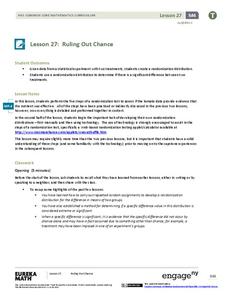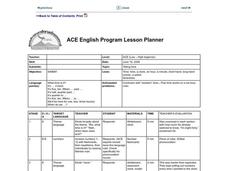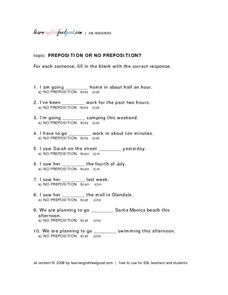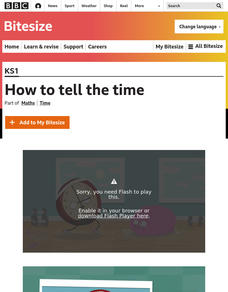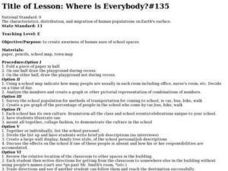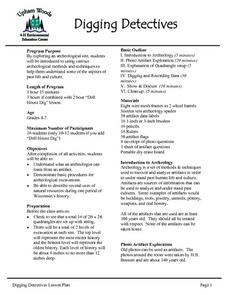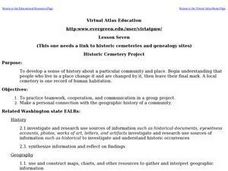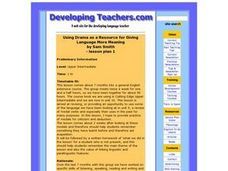Curated OER
Fossil Inferences
Fourth graders use their knowledge about fossils to arrange fossil pictures in sequence from oldest to youngest. They explain how fossils can be used to make inferences about past life, climate, geology, and environments and discover...
National Endowment for the Humanities
Women's Lives Before the Civil War
Women's lifestyles before the Civil War made a huge impact as a point of causation. Give middle schoolers the opportunity to view firsthand the lives of women before the Civil War. They analyze primary source documents, view photographs,...
EngageNY
Ruling Out Chance (part 3)
Pupils analyze group data to identify significant differences. They use simulation to create their own random assignment data for comparison.
Curated OER
Fantastic Fractions
Students work in small groups to find pictures that represent the fractions 1/2, 1/3, and 1/4. They paste their examples onto bulletin board paper and share their results with the rest of the class.
Curated OER
Classifying Living and Non-Living Objects
Students investigate living organisms and define the properties of a living species. In this life characteristic lesson plan, students examine plants in their class and discuss whether or not they are alive. Students create a living...
Curated OER
10 Apples Up On Top
Stuents make class books as a follow up activity to the Dr. Seuss book Ten Apples Up On Top!
Curated OER
Telling Time
Students tell time. For this ELL vocabulary development and math lesson, students orally tell time to five minute intervals when shown a classroom clock. Students practice using number and "telling time" vocabulary in sentences and...
Curated OER
Real Life Challenge
Ninth graders read and examine narratives, review chronologies, consider ideas, and analyze trends in order to understand the past and present. In this American History lesson plan, 9th graders examine cause and effect, review...
Curated OER
Economics
High schoolers review economic trends from the past 30 years. They compare and contrast GDP and GNP. They identify other social indicators of economic progress as well.
Curated OER
I Highly Recommend It
Sixth graders read, "The Watsons Go to Birmingham", and submit a critical review to Amazon Website online by copying and pasting their text onto the site.
Curated OER
Preposition Or No Preposition?
In this preposition or no preposition worksheet, students, for each of ten sentences, fill in each blank with the correct preposition that makes each sentence grammatically correct.
Curated OER
Voting and the U.S. Constitution (Past, Present, and Future), Part 2
Students analyze and discuss the 19th Amendment, and read the document, Why Women Want to Vote. Students illustrate statements from the handbill, then conduct a play about women's suffrage.
Curated OER
Telling Time
Young learners participate in activities which help them understand analog clocks, and the vocabulary of telling time. They examine the values of the intervals of minutes and hours by making a human clock.
Curated OER
Telling Time
First graders play a fun game while learning to tell time. This BBC site is well designed. They enjoy it while learning a lot. Playing in pairs would be lots of fun.
Curated OER
Reading Comprehension 8 – Checking Train Times
In this reading comprehension worksheet, students read and analyze a short passage on "Checking Train Times," and then answer twenty reading comprehension questions associated with the passage.
Curated OER
Where is Everybody?#135
Students examine the human uses of school spaces through a variety of activities. They draw the playground during recess and not during recess. They determine how many people use each room at different times before graphing the...
Curated OER
Digging Detectives
Young scholars demonstrate basic procedures for archeological excavations. They explore an archeological site, students using various archeological methods and techniques to determine some of the aspects of past life and culture.
Curated OER
Political Parties Then & Now
Students research information about candidates both past and present. They role play a party member, the public or the press to present information.
Curated OER
Historic Cemetery Project
Young scholars use the Virtual Atlas to examine the cemetaries in the state of Washington. In groups, they view photographs of local monuments to celebrate the lives of local members. They choose one to focus on and research. To end...
Curated OER
Parents and Teen Hardships
Students analyze the cause and effects of fading traditions and explore the parent teen relationships through poetry. In this past analysis lesson plan, students complete a cause and effect worksheet about a related movie. Students free...
Curated OER
Using Drama as a Resource for Giving Language More Meaning
Learners revise and provide spoken and written practice of modal verbs in the past for criticism.
Curated OER
Yesterday's Trash
Students create a trash book or individual student books using cereal boxes. They record everything thrown away and use one page for each category.
Curated OER
It's About Time
In collaborative teams, young scholars create individual autobiographical presentations that help them investigate their historical background. As they collaborate and create their projects they discuss and come to realize how current...




